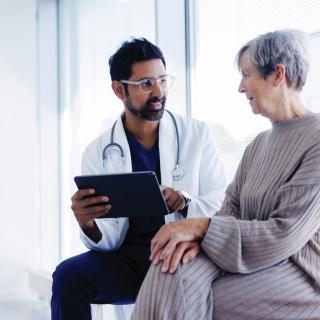Gaining a better understanding of biosimilars

What you need to know as a specialty prescriber
The specialty medication industry continues to see significant shift in the landscape with the increase in number of FDA-approved biosimilars. At Accredo, we have access to nearly every biosimilar available, and the data tell us utilization is increasing, particularly for inflammatory conditions. These complex biological products are equally efficacious in treatment and will undoubtedly change the market by offering cost-effective alternatives to their reference product.
This article aims to provide a basic overview of biosimilars, encourage deeper learning and acceptance as cost-effective alternatives, as well as offer thoughts on how biosimilars are positively impacting the specialty pharmacy landscape.
What are biosimilars?
Biosimilars are biological products that are “highly similar to” and have “no clinically meaningful differences” from an existing FDA-approved reference product. Unlike generic versions of small-molecule drugs, which are identical to their branded counterparts, biosimilars are large and complex molecules derived from living cells. They are designed to mimic the structure and function of the reference product, offering similar efficacy and safety profiles.
Development process is rigorous and complex.
The development of biosimilars involves a rigorous and complex process to ensure their safety, efficacy, and similarity to the reference drug. The key steps in biosimilar development include:
- Analytical Characterization: Extensive testing is conducted to understand the structural and functional characteristics of both the biosimilar and the reference drug. This involves comparing the primary structure, post-translational modifications, and biological activity.
- Preclinical Studies: Animal studies are used to evaluate the pharmacokinetics, pharmacodynamics, and toxicity of the biosimilar, providing valuable data for designing clinical trials.
- Clinical Trials: Biosimilars undergo clinical trials to demonstrate their similarity to the reference product in terms of safety, efficacy, and immunogenicity. These trials typically include phase I, phase II, and phase III studies involving healthy volunteers and patients.
- Regulatory Approval: The U.S Food and Drug Administration (FDA) reviews comprehensive data from the analytical, preclinical, and clinical studies before granting approval. Biosimilars require a robust regulatory pathway.
Regulatory landscape is comprehensive.
The biosimilars pipeline is subject to an abbreviated, yet thorough regulatory pathway that recognizes the inherent complexity of these biologic products. Regulatory agencies have established guidelines outlining the requirements for demonstrating biosimilarity, with a focus on analytical comparability, clinical similarity, and post-marketing surveillance. Key considerations in the regulatory process include:
- Extrapolation: If a biosimilar is proven to be similar in one indication, approval for other indications for the reference product may be granted based on scientific justification. Extrapolation is assessed only after biosimilarity is confirmed and reduces the need for duplicative clinical studies.
- Interchangeability: Some biosimilars may be deemed interchangeable biosimilar therapies with the reference product, allowing for substitution without the intervention of the prescribing health care provider.
Double-click on interchangeability
Interchangeable biosimilar therapies are FDA-approved to allow substitution for or from its reference product without the intervention of the prescribing health care provider, unless required by state pharmacy laws.
An interchangeable biosimilar can be expected to safely produce the same clinical result as the reference product with no greater safety risk or risk of reduced efficacy from alternating or switching between it and its reference product.
With more interchangeable biosimilars coming to market, Accredo has mobilized a multichannel model of proactive communications to support seamless therapy conversions.
Positive impact on specialty pharmacy
Biosimilars have the potential to significantly impact health care by increasing access to effective treatments and reducing the financial burden associated with specialty therapies. The introduction of biosimilars often results in market competition, leading to lower prices and improved affordability for patients and the health care system.
However, challenges such as concerns about immunogenicity, manufacturing complexities, and the evolving regulatory landscape continue to shape the adoption and acceptance of biosimilars. Health care providers, patients, and policy makers play crucial roles in ensuring successful integration of biosimilars into clinical practice.
Conclusion: Embracing biosimilars in clinical practice
Biosimilars represent a promising avenue in the evolution of biopharmaceuticals, offering cost-effective alternatives to reference biologics while maintaining high standards of safety and efficacy. As the biosimilar market continues to grow and mature, ongoing research, education, and collaboration among stakeholders will be essential to harness the full potential of these innovative therapeutic options.
At Accredo, we make the process of prescribing a safe, effective biosimilar simple. Learn more about the process here.




